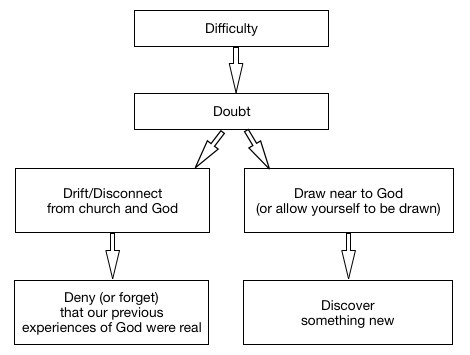Difficulties in life can have negative impacts on our Christian lives - it is wise to do some preparation

After the global financial crisis in 2007, people conducted modelling of banks to stress test them and see if they could survive similar crises in the future. As a result of this governments took action to make them more robust.
We also go through crises. Some of us may be going through a crisis at the moment, but almost all of us will go through one or more in the future. Since we will experience crises in our lives it is wise for us to do some stress testing - to think about what difficulties we might experience and how they could negatively impact our Christian lives. That is what this blog is designed to help us do.
But before we go further, I want to make sure that no one who reads this blog feels under any pressure to live up to a particular standard or to respond in a ‘faith-filled’ way, particularly if you are in the middle of a difficulty or crisis. When any of us enter a crisis or difficulty we don't really know how we are going to handle it, even if we have experienced similar circumstances in the past. So if these thoughts are helpful please use them, but if not please just set them aside.
So what sorts of difficulties will we encounter in life? Well they include:
Disagreements
We all have disagreements with people but they can be particularly difficult if they involve close family members, friends, and those we trust. It can sometimes really knock our Christian faith if the disagreement involves other Christians, theology, or how church should be run.
Disappointments
People will let us down, and we can even let ourselves down. Again with closer relationships the impact can be greater. These can also knock our faith, especially if we are disappointed with a church, church leaders or even God (eg unanswered prayer).
Disasters
These can be both natural (earthquakes, floods, fires) and manmade (war, violence, crimes etc). These sources of suffering can often dent our faith and cause use to question and doubt.
Decay/Disease
We get older and can't do the things we once did. We contract diseases that can be debilitating and painful.
Death
Our own deaths usually don’t negatively impact our Christian faith because we will be with Jesus. However, the death of loved ones or the innocent can really dent our faith.
What can help us prepare for and respond to these eventualities?
1. Don’t be surprised when they happen to you
When we read the New Testament we see that Paul experienced all of these and he was one of the most spiritual/fruitful Christians who has ever lived. He was disappointed with John Mark who abandoned a missionary journey and had sharp disagreements with Barnabas when he wanted to take John Mark on their second journey (they ended up going their separate ways). He experienced the disaster of shipwrecks, disease that left his body weak, and was eventually martyred.
Even Jesus experienced disagreements (eg with Peter), disappointments with his betrayal by Judas, the disaster of the slaughter of infants in Bethlehem (imagine being reminded of that growing up), and the death of his earthly father some time between the ages of 12 and 30 years old.
Even though the suddenness of disasters can be a shock, it can be helpful to recognise that these sorts of things happen all the time, to people of all walks of life, and Christians of all levels of maturity.
Jesus said in John 16:33 ‘In this world you WILL have trouble. But take heart! I have overcome the world.’
2. Don’t be surprised by uneven experiences
James and John were brothers who were some of the first followers of Jesus. James was martyred at a young age and John lived into his nineties and experienced years of imprisonment on Patmos. Most of us know people who have had lots of difficulties and others who have only had a few (at least until now).
The reality of life is that difficulties happen and they are distributed unevenly.
3. Understand the Dynamics of what can happen

Difficulties confront us with new circumstances that can cause us to reconsider what we think about life, reality, ourselves, others, and God. Doubt is the process of questioning what we think we know and/or rely on. Processing and responding to our doubt can lead to the weakening of our faith, but it can also lead to the deepening and strengthening of our faith as we discover new things about ourselves, the world, and God.
4. Draw near to God (or allow yourself to be Drawn)
Martha was a follower of Jesus who was disappointed with her sister Mary for not helping her prepare a meal for Jesus. She had a disagreement with Jesus about Mary’s priorities (Luke 10:38-42). Then both Martha and Mary were confronted with the death of their brother, Lazarus (John 11:1-44).
When their brother Lazarus was sick, Martha and Mary sent for Jesus. Jesus waited a few days before going and by the time he arrived, Lazarus had died. Martha went out to Jesus (she drew near to Him) and was raw and honest - ‘if you had been here, my brother would not have died’. Jesus said her brother would rise again and Martha responded with the standard theological answer that she knew he would rise at the last day.
Then she discovered something new - Jesus revealed to her that he was the resurrection and the life, that those who believe in him would live even though they die, and that whoever lived by believing in him would never die (John 11:25-26). In the midst of the difficulty, her standard hope of a future resurrection was expanded and revealed to be anchored in Jesus.
In the events of Luke 10, Mary seemed to be the more spiritually minded sister. But in these events, she was not able to go to Jesus by herself. (None of us can be totally sure of how we will respond to difficulties). But then Martha came and drew her to Jesus. (John 11:28-29)
Sometimes the difficulties of life will so knock us that we won’t have the energy to draw near to God. In those times, without putting any pressure on anyone, I would like to suggest we could consider letting someone else draw us to God just like Martha did with Mary.
Final thought
Difficulties are called that because they are difficult. Responding to them can also be hard and we shouldn't put pressure on ourselves to be experts in responding. But if you found these thoughts helpful just have a go at applying them as best you can.
David Wanstall, 18/10/2017